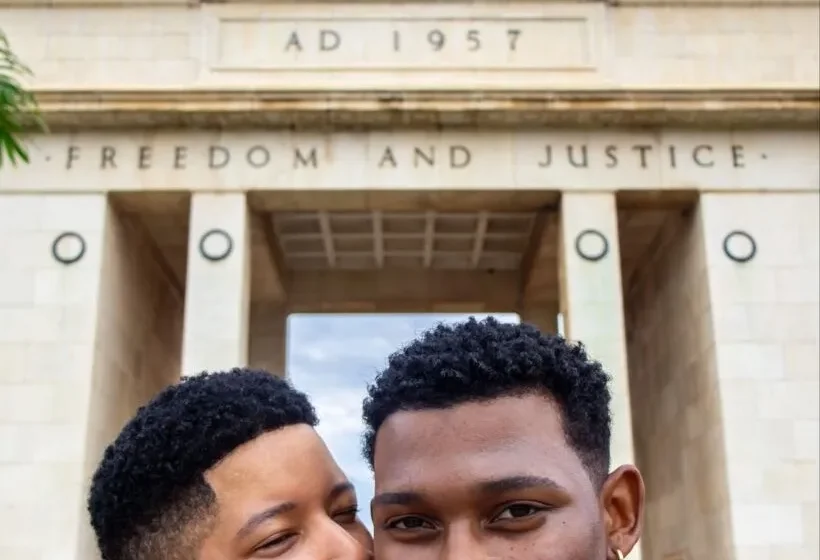Is viral image of South African gay couple kissing at Black Star Square in Ghana AI-generated?

Dubawa debunks MP’s false AI claim about viral LGBTQ+ photo at Ghana’s Independence Square
A Ghanaian lawmaker, Rockson-Nelson Dafeamekpor, has come under scrutiny after falsely claiming that a viral photo of a South African gay couple kissing at Ghana’s iconic Independence Square was generated using artificial intelligence (AI).
The photo, which gained significant attention in June 2025, features South African queer couple Lue and Rue expressing affection in front of major Ghanaian landmarks, including Black Star Square and the Kwame Nkrumah Memorial. The couple had posted the image as part of the #ShowGhanaLove campaign—an initiative aimed at highlighting the experiences and challenges of the LGBTQI community in Ghana and advocating for inclusivity and visibility across Africa.
While the campaign received support from some LGBTQ+ rights advocates, it also drew backlash from various segments of the Ghanaian public, with critics accusing the couple of disrespecting Ghanaian cultural and moral values. Among the critics was the Minister of Communication and Digital Technology, Sam George, who labeled the campaign offensive and contrary to Ghanaian traditions.
However, it was Dafeamekpor’s remarks on the floor of Parliament that sparked a fresh wave of controversy. Speaking during a parliamentary session on July 11, 2025, Dafeamekpor, who is the Majority Chief Whip, dismissed the image as inauthentic and claimed it was artificially created.
“The matters that the First Deputy Minority Whip alludes to, the fact that two persons were seen kissing at the Independence Square, are totally false. It was an AI-generated image posted by someone to their social media handle,” he said while responding to a submission by fellow lawmaker Habib Iddrisu.
Iddrisu had earlier called on Parliament to summon the Minister of Foreign Affairs to address the growing LGBTQ-related discourse, particularly in light of the South African couple’s visit to Ghana.
Given the sensitivity of the issue and its cultural implications, Dubawa, a West African fact-checking platform, conducted a thorough verification of the viral image to determine whether the AI claim was valid.
Using advanced AI-content detection tools such as Hive Moderation and SightEngine, Dubawa found no evidence to support the claim that the image was generated by artificial intelligence. Hive Moderation categorized the image as highly unlikely to contain AI-generated elements, while SightEngine assigned it a low probability score of just 22%.
In addition to the tool-based analysis, Dubawa’s researchers conducted a manual inspection of the photo. They noted that common indicators of AI generation—such as distorted fingers, misaligned features, or warped background structures—were absent. The couple’s physical features appeared consistent across multiple images posted on their verified social media accounts. Likewise, the Independence Square setting matched verified photos of the landmark.
Further disproving the lawmaker’s claim, the couple’s post included captions and hashtags referencing a broader campaign and cultural visit to Ghana, which was documented in a series of images showing different locations and public interactions.
Following public backlash and fact-based rebuttals—particularly from social media users like @Gen_Buhari on X (formerly Twitter)—Dafeamekpor retracted his earlier claim, admitting that he had been misinformed.
Conclusion
Dubawa’s investigation confirms that the viral image of Lue and Rue kissing at Independence Square is authentic and not AI-generated. The claim made by Rockson Dafeamekpor on the floor of Parliament has been found to be false. The incident underscores the importance of fact-checking, especially by public officials, before making declarations on sensitive matters that can deepen social divides or perpetuate misinformation.

